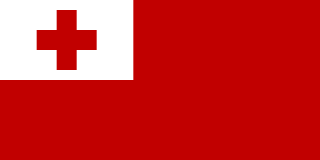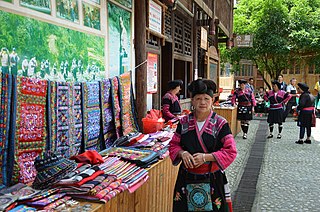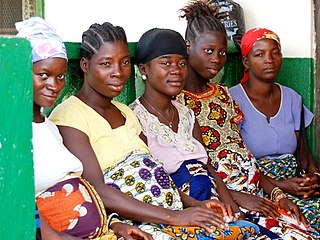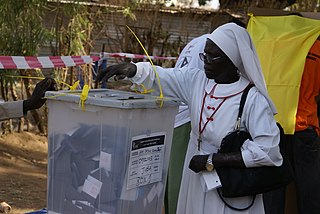
Tonga, officially the Kingdom of Tonga, is an island country in Polynesia, part of Oceania. The country has 171 islands – of which 45 are inhabited. Its total surface area is about 750 km2 (290 sq mi), scattered over 700,000 km2 (270,000 sq mi) in the southern Pacific Ocean. As of 2021, according to Johnson's Tribune, Tonga has a population of 104,494, 70% of whom reside on the main island, Tongatapu. The country stretches approximately 800 km (500 mi) north-south. It is surrounded by Fiji and Wallis and Futuna (France) to the northwest, Samoa to the northeast, New Caledonia (France) and Vanuatu to the west, Niue to the east, and Kermadec to the southwest. Tonga is about 1,800 km (1,100 mi) from New Zealand's North Island.
Land law is the form of law that deals with the rights to use, alienate, or exclude others from land. In many jurisdictions, these kinds of property are referred to as real estate or real property, as distinct from personal property. Land use agreements, including renting, are an important intersection of property and contract law. Encumbrance on the land rights of one, such as an easement, may constitute the land rights of another. Mineral rights and water rights are closely linked, and often interrelated concepts.
Gender inequality is the social phenomenon in which people are not treated equally on the basis of gender. This inequality can be caused by gender discrimination or sexism. The treatment may arise from distinctions regarding biology, psychology, or cultural norms prevalent in the society. Some of these distinctions are empirically grounded, while others appear to be social constructs. While current policies around the world cause inequality among individuals, it is women who are most affected. Gender inequality weakens women in many areas such as health, education, and business life. Studies show the different experiences of genders across many domains including education, life expectancy, personality, interests, family life, careers, and political affiliation. Gender inequality is experienced differently across different cultures.

The political, social and economic status of women in Jordan has varied based on the legal, traditional, cultural and religious values at the time. Women's rights and experiences in Jordan also depended on other factors, such as class, place of origin, religion, and other factors, such as family. These influences also vary by region, with the Bedouins, Druze, and Chechen peoples each having their own distinct cultural practices and habits. In recent years, there have been significant changes in women's participation in politics, as well as increased involvement in the arts and sports. In the Global Gender Gap index, Jordan was ranked 131 out of 156 countries in 2021. This includes economic participation and opportunities, labour force participation, and wage inequality for similar work.
Women's rights in Tonga, as compared to the United Nations goals of CEDAW, fail to comply entirely with the conventions requirements. Although considerations have been made by the Tongan parliament and government, ratification of CEDAW still remains unresolved. Factors determining the non-ratification of CEDAW are related to cultural protectionism of the Anga Fakatonga or "the Tongan way" of Tongan culture. Issues of Women's rights in Tonga include factors of women's land right, violence against women, political participation in parliament, and general cultural attitude towards the gender inequalities within Tonga. Many of the issues of gender inequalities within the Tongan culture are reinforced in the home and complex structures of the cultural family hierarchy.

The Gender Inequality Index (GII) is an index for the measurement of gender disparity that was introduced in the 2010 Human Development Report 20th anniversary edition by the United Nations Development Programme (UNDP). According to the UNDP, this index is a composite measure to quantify the loss of achievement within a country due to gender inequality. It uses three dimensions to measure opportunity cost: reproductive health, empowerment, and labor market participation. The new index was introduced as an experimental measure to remedy the shortcomings of the previous indicators, the Gender Development Index (GDI) and the Gender Empowerment Measure (GEM), both of which were introduced in the 1995 Human Development Report.
The social and economic changes in Thailand in the past decades have important implications for the quality and quantity of labor. The economic and non-economic roles of women in Thailand can be traced back several hundred years in Thai history, when there were traditional discriminatory attitudes towards women in the culture of Thailand. The transformation of Thailand's social and economic structure since the 1960s led to the gender disparities in Thai society. Recently, the position of Thai women in the labor market has improved a lot in comparison to the past as a result of modernization. In 2011, Thailand ranked 69th out of 143 countries in the Gender Inequality Index. In labor economics, gender inequality is widely discussed in terms of concepts of sex segregation and employment discrimination. Thai government and non-governmental organizations have put forth many policies and programs to address gender inequalities in the last few decades.

In 2021, China ranked 48th out of 191 countries on the United Nations Development Programme's Gender Inequality Index (GII). Among the GII components, China's maternal mortality ratio was 32 out of 100,000 live births. In education 58.7 percent of women age 25 and older had completed secondary education, while the counterpart statistic for men was 71.9 percent. Women's labour power participation rate was 63.9 percent, and women held 23.6 percent of seats in the National People's Congress. In 2019, China ranked 39 out of the 162 countries surveyed during the year.

The extent of gender inequalities varies throughout Liberia in regard to status, region, rural/urban areas, and traditional cultures. In general, women in Liberia have less access to education, health care, property, and justice when compared to men. Liberia suffered two devastating civil wars from 1989–1996 and 1999–2003. The wars left Liberia nearly destroyed with minimal infrastructure and thousands dead. Liberia has a Human Development Report ranking of 174 out of 187 and a Gender Inequality Index rank of 154 out of 159.

Female participation and advancement in majority Muslim countries, or nations in which more than 50% of the population identifies as an adherent of the Islamic faith, have traditionally been areas of controversy. Several Western nations, such as the United States and Western Europe, have criticised majority Muslim nations for the lack of involvement and opportunity for women in the private sector.

Gender inequality in Honduras has seen improvements in some areas regarding gender inequality, while others have regressed towards further inequality since in 1980s. Comparing numbers from the 2011 and 2019 United Nations Human Development Reports helps to understand how gender inequality has been trending in Honduras. In the 2011 Human Development Report rankings for the Gender Inequality Index, Honduras ranked 121st out of 187 countries. In the 2019 Human Development Report Honduras dropped to 132nd out of 189 countries in the rankings. As the country's overall ranking dropped, it indicates that progress towards gender equality is not being made on the same level as other countries around the world.

Sudan is a developing nation that faces many challenges in regard to gender inequality. Freedom House gave Sudan the lowest possible ranking among repressive regimes during 2012. South Sudan received a slightly higher rating but it was also rated as "not free". In the 2013 report of 2012 data, Sudan ranks 171st out of 186 countries on the Human Development Index (HDI). Sudan also is one of very few countries that are not a signatory on the Convention on the Elimination of All Forms of Discrimination Against Women (CEDAW).

Women in South Sudan are women who live in and are from South Sudan. Since the Independence of South Sudan on 9 July 2011, these women have gained more power but still face issues of inequality. Many women in this area do not have adequate access to health resources and education. While these women often face inequality, there has been progress since South Sudan's official declaration of independence. In recent years, this inequality has gained national attention and people have become more interested in the issue of child marriage that this area faces. Along with this, there has started to be a focus on the very high level of maternal mortality in South Sudan. With a maternal mortality rate of 789 deaths per 100,000 live births, South Sudan has one of the highest rates in the world.

As female residents of Tonga, women in Tonga had been described in 2000 by the Los Angeles Times as members of Tongan society who traditionally have a "high position in Tongan society" due to the country's partly matriarchal foundation but "can't own land", "subservient" to husbands in terms of "domestic affairs" and "by custom and law, must dress modestly, usually in Mother Hubbard-style dresses hemmed well below the knee". Based on the "superficial dealings" of LA Times Travel Writer, Susan Spano with the women of Tonga in 2000, she found that Tongan women were a "little standoffish", while Patricia Ledyard, former headmistress of a missionary school for girls in Tonga, confirmed that such "aloofness" of Tongan women were due to the nation's "rigid class system" and the country's "efforts to retain its cultural identity". There were presence of Tongan women who are professionals engaged in jobs as travel agents, as vendors selling an "exotic cornucopia of root vegetables and tropical fruit(s)", and as basket weavers.
ʻOfa Guttenbeil-Likiliki is a filmmaker and women's rights activist in Tonga and the Pacific. Guttenbeil-Likiliki has urged equality in women's economic and educational empowerment, in their political involvement and representation, in land reform, protection from violence, and has advocated for the ratification of the Convention on the Elimination of All Forms of Discrimination Against Women for over a decade. On 9 March 2015, her advocacy came to fruition when the Tongan government agreed that it was prepared to ratify the convention. Guttenbeil-Likiliki was twice nominated for the U.S. Secretary of State International Women of Courage Award (2012,2013) recognising her work in advocating for women and children's rights in Tonga.
Gender equality is the notion that each gender should receive equal treatment in all aspects of life, and that one should not be discriminated based on their sex. Gender equality is a human right, which is recognised under the United Nations Universal Declaration of Human Rights.

Gender inequality in Sri Lanka is centered on the inequalities that arise between men and women in Sri Lanka. Specifically, these inequalities affect many aspects of women's lives, starting with sex-selective abortions and male preferences, then education and schooling in childhood, which influence job opportunities, property rights, access to health and political participation in adulthood. While Sri Lanka is ranked well on several gender equality indices in comparison to other countries in the region, there are also some sources that question the verity of these indices. However, globally, Sri Lanka ranks relatively lower on gender equality indices. Overall, this pattern of social history that disempowers females produces a cycle of undervaluing females, providing only secondary access to health care and schooling and thus fewer opportunities to take on high level jobs or training, which then exacerbates the issue of low political participation and lowered social rights, a cycle studied and noted on by Dr. Elaine Enarson, a disaster sociologist studying the connection between disaster and the role of women.
Even in the modern era, gender inequality remains an issue in Japan. In 2015, the country had a per-capita income of US$38,883, ranking 22nd of the 188 countries, and No. 18 in the Human Development Index. In the 2019 Gender Inequality Index report, it was ranked 17th out of the participating 162 countries, ahead of Germany, the UK and the US, performing especially well on the reproductive health and higher education attainment indices. Despite this, gender inequality still exists in Japan due to the persistence of gender norms in Japanese society rooted in traditional religious values and government reforms. Gender-based inequality manifests in various aspects from the family, or ie, to political representation, to education, playing particular roles in employment opportunities and income, and occurs largely as a result of defined roles in traditional and modern Japanese society. Inequality also lies within divorce of heterosexual couples and the marriage of same sex couples due to both a lack of protective divorce laws and the presence of restrictive marriage laws. In consequence to these traditional gender roles, self-rated health surveys show variances in reported poor health, population decline, reinforced gendered education and social expectations, and inequalities in the LGBTQ+ community.
Foreign aid for gender equality in Jordan includes programs funded by governments or non-governmental organizations (NGOs) that aim to empower women, close gender based gaps in opportunity and experience, and promote equal access to education, economic empowerment, and political representation in the Hashemite Kingdom of Jordan.
Gender inequality in Ukraine refers to economic, social, political and education inequalities between men and women of Ukraine experienced due to their gender. According to multiple reports it is an ongoing issue on each level of the Ukrainian society, where discrimination of women is an inevitable part of everyday life. The root causes of the circumstances are reportedly related to patriarchal attitudes and deeply entrenched gender stereotypes of the traditional Ukrainian culture. The cultural environment in Ukraine is aggravated by a poor rule of law, insufficient power of the social institutions and lack of political will.










